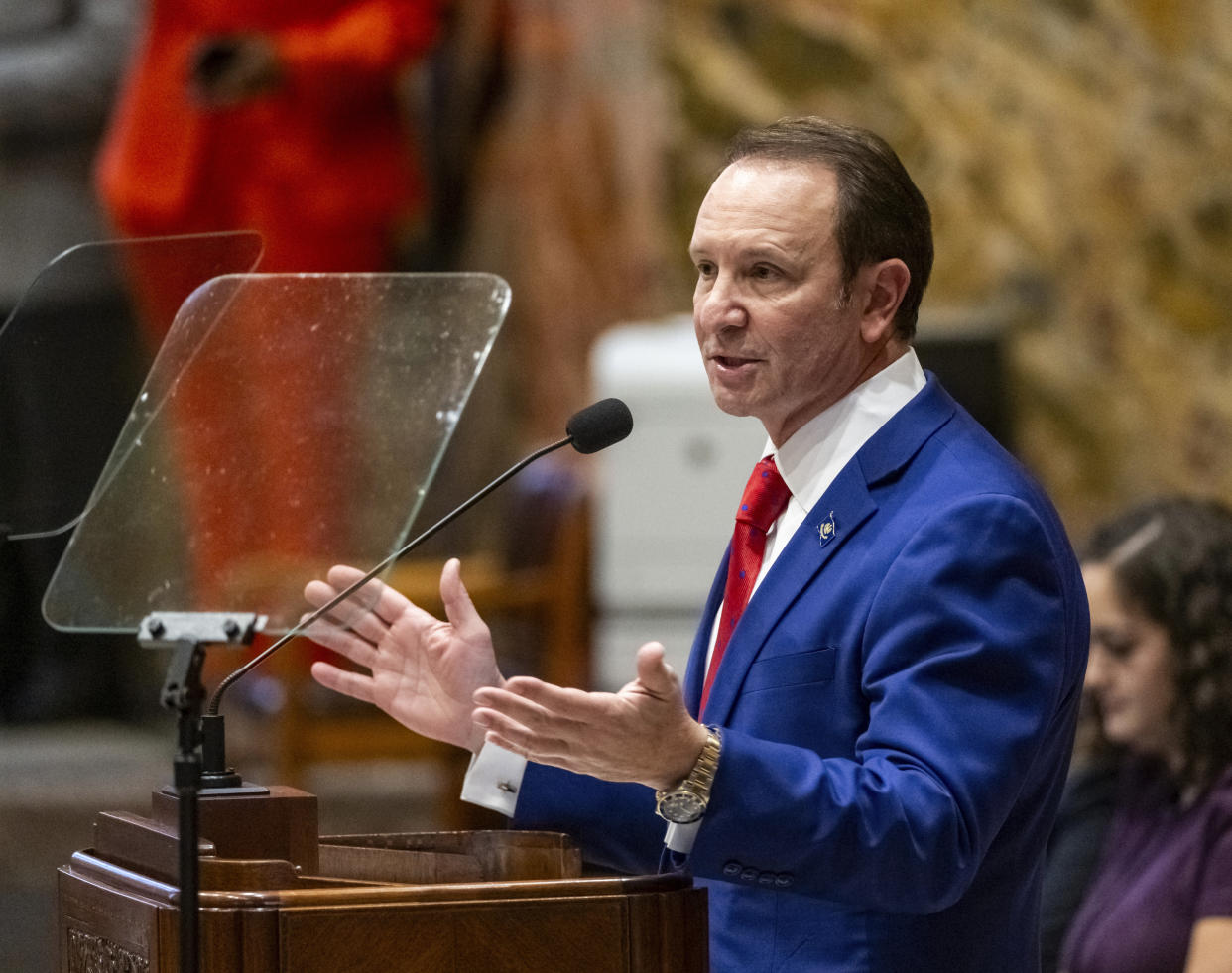Louisiana law that could limit filming of police hampers key tool for racial justice, attorneys say

- Oops!Something went wrong.Please try again later.
- Oops!Something went wrong.Please try again later.
A new Louisiana law that makes it a crime to approach within 25 feet (7.6 meters) of a police officer under certain circumstances is an affront to the movement for racial justice and violates the First Amendment, civil rights attorneys say.
Critics have said the law — signed this week by Republican Gov. Jeff Landry — could hinder the public’s ability to film officers. Bystander cellphone videos are largely credited with revealing police misconduct such as the 2020 killing of George Floyd by a white Minneapolis police officer.
“When you enact a law that prevents people from seeing for themselves whether injustice is being done, that is the biggest thing against civil rights you can ever do," said Shean Williams, an attorney with The Cochran Firm in Atlanta.
Williams said images of police attacking demonstrators during the civil rights movement were instrumental to its success in advancing racial justice.
Proponents argue the new law will create a buffer zone to help ensure the safety of officers and that bystanders would still be close enough to film police interactions. Florida Gov. Ron DeSantis, also a Republican, signed a similar measure into law in April, saying it would help ensure law enforcement officers in his state can “do their jobs without the threat of harassment.”
In a statement at the time, DeSantis drew a distinction with “blue states,” saying Florida would continue to be "the friendliest state in the nation towards our law enforcement community.”
The Louisiana measure’s author, state Rep. Bryan Fontenot, said the legislation was drafted to provide officers “peace of mind and safe distance to do their job.”
“At 25 feet, that person can’t spit in my face when I’m making an arrest,” Fontenot said while presenting his bill in a committee earlier this year. “The chances of him hitting me in the back of the head with a beer bottle at 25 feet — it sure is a lot more difficult than if he’s sitting right here.”
But attorneys say states, including Florida and Louisiana, already have laws that criminalize efforts to obstruct police.
“The key in every other state is, ‘Are you disrupting the conduct of the officer? ’ " said Gerry Weber, a constitutional law expert in Atlanta who has represented numerous people in lawsuits over filming police misconduct. "One of the problems with the Louisiana law is it creates a presumption that one is interfering if they’re within 25 feet and they have been given a warning.”
Weber helped reach a settlement more than a decade ago that required Atlanta police to stop interfering with people who record officers performing their duties in public.
At least one other state created a law similar to the ones in Louisiana and Florida. In 2022, Arizona made it illegal to knowingly film a police officer from 8 feet (2.5 meters) or closer if the officer told the person to stop.
U.S. District Judge John J. Tuchi in Phoenix last year blocked enforcement of that statute, saying it “prohibits or chills a substantial amount of First Amendment protected activity and is unnecessary to prevent interference with police officers given other Arizona laws in effect.”
The Louisiana law does not specifically mention filming. It prohibits “knowingly or intentionally” approaching an officer who is “lawfully engaged in the execution of his official duties” after being ordered to “stop approaching or retreat.” Violators face up to a $500 fine, up to 60 days in jail, or both. It goes into effect on Aug. 1.
But even without an explicit reference to filming, the First Amendment concerns remain, said Susan Meyers, a senior staff attorney at the Southern Poverty Law Center.
Courts have been clear that people have a right to observe and film police doing their jobs in public, she said.
“What are they saying? How are they conducting themselves?” she said. “There are in fact very few ways for the public to hold these public servants accountable for their actions.”
Alanah Odoms, executive director of the ACLU of Louisiana, said she experienced the importance of filming police first-hand last year when she and some colleagues were pulled over by an officer who said he suspected the vehicle they were in was stolen.
The car wasn't stolen, and Odoms, who has denounced the new Louisiana law, said she believes the justification was pretextual. On a dark, deserted road, she said filming the encounter gave her comfort.
“I'm probably within 8 to 10 feet of the officer and then two or three feet,” she recalled. “I would not be able to do any of that.”

